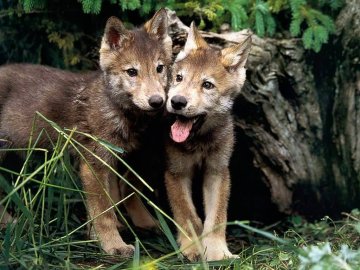Wolf Pups
 The pack’s reproduction habits are quite different from other animals and they follow a strict hierarchical organization where only the Alpha gets the opportunity to produce offspring.
The pack’s reproduction habits are quite different from other animals and they follow a strict hierarchical organization where only the Alpha gets the opportunity to produce offspring.
Gestation Period
Wolf packs usually have a yearly reproduction cycle that takes place during the months of January through March. Following a gestation period of two months, four to six pups are born. In some cases, the number can go up. In one case, a female wolf managed to give birth to 14 pups while in captivity.
After the Birth
After the pups are born, they stay in the den for their first 30 days as they are too weak on their own. At this stage, they only weigh about one pound, but they have an accelerated growth rate. During their first three months, wolf pups can gain around three pounds per week.
When they are born, pups are both deaf and blind. After 10 days, they begin hearing and their eyes open. Also, their fur color can change during that time. Even if they can hear, their ears will remain floppy until they are one month old, which is when they begin to stand up.
Leaving the Den
Not all pups survive their first 30 days. In fact, 50% of them end up falling sick or getting killed. The ones that do survive will get to go outside the den when they are one month old.
During these early stages of life, pups are very curious and playful. They are also bold and aggressive which leads to the creation of their own hierarchy. The most dominant ones will get to bully around the weaker pups.
They will also benefit from some privileges. Wolf pack members will take turns to protect them. Also, even the Alpha male will let them feed first, even ahead of him. This happens after their sixth week when their teeth are strong enough to chew fresh meat. Until then, they will be fed with digested meat by the mother.
Growing Up
In the pack, the pups always have priority and every member has to protect them. The study of the pack’s behavior revealed that pups have more privileges than even the lowest ranked adult wolves. However, all this ends when they reach adolescence and they will have to hunt and fight with others for food.
At that point, they can choose to stay with the pack or leave and establish one of their own. It is more common to see males leave the pack while the females generally decide to stay amongst the ones with which she was born.
